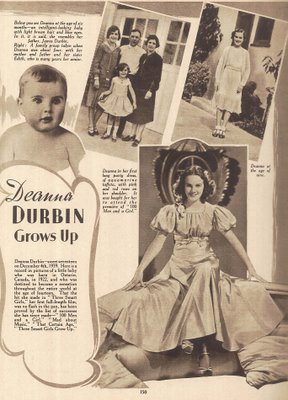
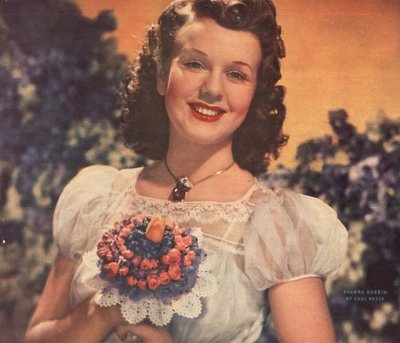
Monday Glamour Starter --- Deanna Durbin --- Part One
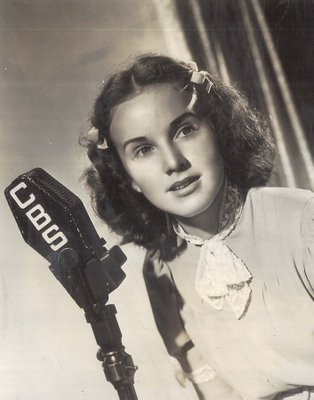
The road has stretched a long way since Deanna Durbin first came upon the scene, stole our collective hearts, then retreated into a very private life. She’s 84 now, so how old does that make her fans? As to more of them generated since her retirement in the late forties, I say, show me. It’d be great to report an upsurge of interest in Deanna, and I say that as an admirer of long standing, but what chance has the woman got when no one’s showing her all but one black-and-white features? The tiny niche of Durbin-philes grieve more over this than the lady herself, who’s worried not the least about preserving the legacy of a screen character she neither understood nor identified with. Durbin just walked away from it all and never came back. Others did too, but only after careers had washed out with tides. Durbin could have stayed in and triumphed another twenty or thirty years. I’ll bet there wasn’t a colleague of hers in show business that didn’t look on admiringly and say smart move, as she packed off to France and blessed anonymity.
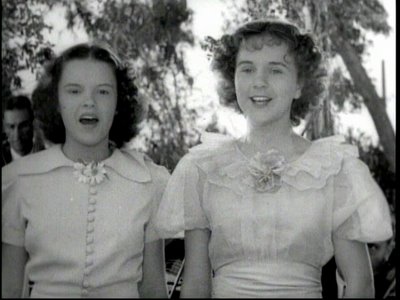
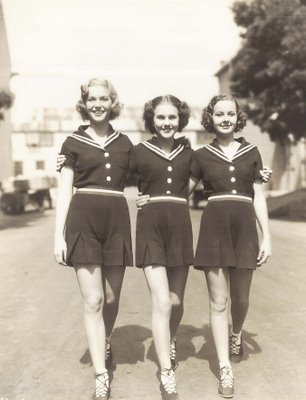
I have this image of Deanna walking briskly down cobblestone streets of her little French village carrying one of those yard-long loaves of bread, possibly singing I Love To Whistle, as she makes her way back to a heavily fortified chateau guarded by dogs named Bruno and Gaston. Journalists have sought her from time to time, but the simple folk in their pastry shops and laundries would feign ignorance in deference to their celebrated neighbor. So what made this highest paid actress in motion pictures high tail it out of the US? Deanna explained in the one interview she’s done in 56 years (with British historian David Shipman in 1983). I consider my salary as damages for having to cope with such complete lack of quality, she said, describing her last four Universal pictures as mediocre … near impossible. There had been twenty-one features and one short (plus a handful of Red Cross and war relief spots). She might have said there was one feature done twenty-one times. Being locked into a formula as unyielding as hers would have jangled anyone’s nerves. Worst of all was fact that Durbin’s screen image was at total variance with everything she was offscreen, and efforts on her part to vary the menu were met with determined resistance, more from her fans than Universal, in fact. What few tentative steps the studio took in that direction (Christmas Holiday, Lady On A Train) saw ferocious objection from the not-so silent army of Deanna devotees. In the end, there was nothing left to do but quit.
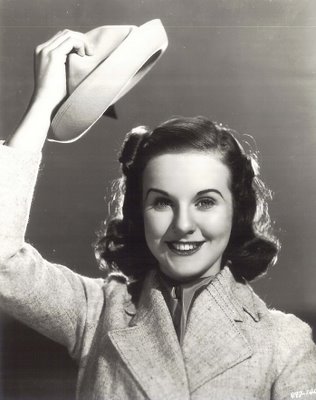
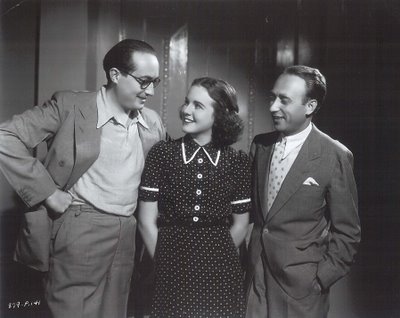
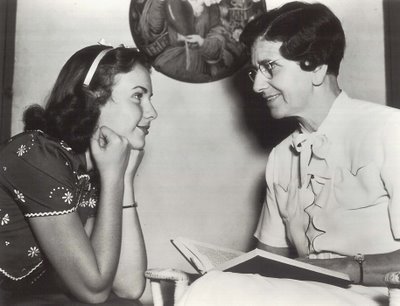
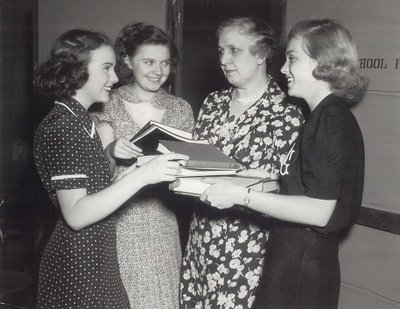 The beginning of it all was 1936. That’s when she joined Eddie Cantor on his CBS radio series and became an airwaves sensation. Child stars being the current rave, there was no question she’d be approached by the film companies, and as things turned out, the one that needed Durbin most desperately was the one that got her. Universal was a minor major, among a "little three" out of the big eight studios. They had production and distribution, but not exhibition. First-run Universal pictures had to get their bookings on merit. Mostly, they serviced rural houses with westerns and serials. Big shows were bigger gambles for them. Metro and Paramount controlled enough venues to guarantee a return on their product. So did Warners, RKO, and Fox. Hard-up Universal was already in receivership when they hired Deanna Durbin. They started slow with $300,000 on a musical comedy, Three Smart Girls, in which Deanna was accorded special-billing. Her overnight stardom was something they all anticipated, for this kind of talent was all but a sure thing. The negative cost of the next one, One Hundred Men and a Girl was goosed to $700,000, and the spiral spun to $850,000 for a third, Mad About Music. This wouldn’t abide, of course, even if Durbin was by now responsible for seventeen-percent of Universal’s overall revenue by the late thirties. Unaccustomed to class pictures, the company had a hard time managing its costs. Deanna’s producer-director team was Joe Pasternak and Henry Koster. They understood the Durbin package and how to make it pay. With these two on board, quality was assured. It was a rigid formula, but an irresistible one. Would the on-screen Deanna work today? She’s pushy, argumentative, manipulative, and not above lying to achieve her ends. That such a character was such an immediate and lasting favorite says a lot about her audience as well. We needed a go-getter to bring us out of the Depression, and this girl was nothing if not that.
The beginning of it all was 1936. That’s when she joined Eddie Cantor on his CBS radio series and became an airwaves sensation. Child stars being the current rave, there was no question she’d be approached by the film companies, and as things turned out, the one that needed Durbin most desperately was the one that got her. Universal was a minor major, among a "little three" out of the big eight studios. They had production and distribution, but not exhibition. First-run Universal pictures had to get their bookings on merit. Mostly, they serviced rural houses with westerns and serials. Big shows were bigger gambles for them. Metro and Paramount controlled enough venues to guarantee a return on their product. So did Warners, RKO, and Fox. Hard-up Universal was already in receivership when they hired Deanna Durbin. They started slow with $300,000 on a musical comedy, Three Smart Girls, in which Deanna was accorded special-billing. Her overnight stardom was something they all anticipated, for this kind of talent was all but a sure thing. The negative cost of the next one, One Hundred Men and a Girl was goosed to $700,000, and the spiral spun to $850,000 for a third, Mad About Music. This wouldn’t abide, of course, even if Durbin was by now responsible for seventeen-percent of Universal’s overall revenue by the late thirties. Unaccustomed to class pictures, the company had a hard time managing its costs. Deanna’s producer-director team was Joe Pasternak and Henry Koster. They understood the Durbin package and how to make it pay. With these two on board, quality was assured. It was a rigid formula, but an irresistible one. Would the on-screen Deanna work today? She’s pushy, argumentative, manipulative, and not above lying to achieve her ends. That such a character was such an immediate and lasting favorite says a lot about her audience as well. We needed a go-getter to bring us out of the Depression, and this girl was nothing if not that.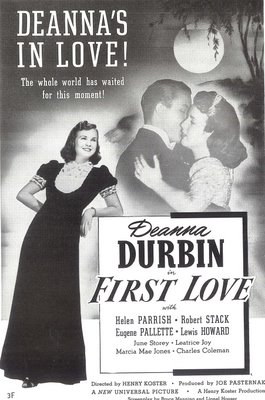
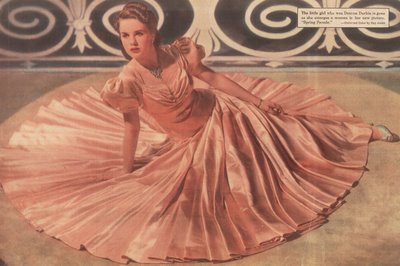
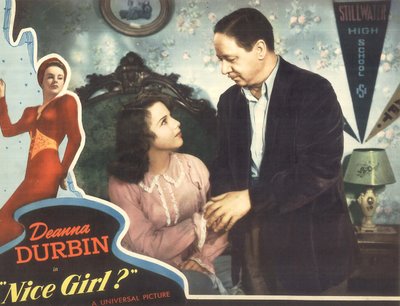
Imitators were inevitable, but who’d have thought Universal would nurture so many of them? The need for a younger substitute to take over child soprano duties for an aging (and increasingly demanding) Deanna resulted in Gloria Jean, but she only emphasized the unique and inimitable ability that was Durbin’s. There was also Susanna Foster, operatic to the point of shattering glassware, but like Gloria, subject to the vagaries of "B" merchandising so typical of the Universal assembly line at that time. I’ve never understood why Foster did Phantom Of The Opera instead of Deanna. Was the idea of a horror film such anathema to the Durbinites? She’d have surely been great in it, and if nothing else would have come away from the career with one movie they’d always remember. All of which brings us to the Judy Garland debate. She ran second to Deanna then, but not now. The Wizard Of Oz took care of that. If we removed Oz from the equation, I wonder how they’d compare. As it is, Judy has survived in the public’s imagination and Durbin has not, yet Garland died 37 years ago and Deanna remains with us. Judy also worked to the very end and left still-popular concert albums. Deanna hasn’t struck a note since the forties. Nevertheless, if I had to pick a winner, I’d have to go with Deanna, because, well, she is still here, after all. Before and after Durbin stepped down, there were ongoing efforts to find her successor. Most of them winnowed on the vine or opted for straight parts. Kathryn Grayson was Pasternak’s first attempt to recreate Durbin after he’d decamped to MGM. Seven Sweethearts was merely the Universal formula transplanted to Culver City. Grayson might have echoed Durbin’s very words when she said her own Metro pictures all seemed alike and took forever to make. Jane Powell was that company's post-war swing at a Durbinesque home run, but Three Daring Daughters, Nancy Goes To Rio (a remake of Deanna’s It’s A Date), and Small Town Girl each lost money. Pasternak desperately wanted Durbin to join him at MGM, though I suspect with his second-tier unit, she’d have faced the same boxoffice uncertainties as Jane Powell. Had she been redirected into Arthur Freed’s group, there’s no doubt we’d have had Deanna singing opposite Gene Kelly and Fred Astaire, which might have been a very rewarding thing.
Photo Captions (Top To Bottom)
Deanna profile from a British fan monthly
Color portrait from an American fan monthly
Doing the Eddie Cantor radio show
Judy Garland and Deanna in Every Sunday (1936)
With Barbara Read and Nan Grey in Three Smart Girls
Deanna in Mad About Music
With Henry Koster and Joe Pasternak
Deanna with her mother
Deanna and fellow students with Universal schoolmarm
Ad art from First Love
Fan magazine color portrait
With Robert Benchley in Nice Girl?